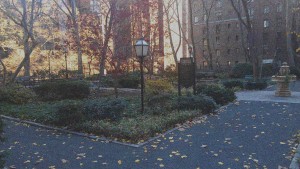Mathes Missive From Moscow #8 – Tuesday: Opening Night

Greetings, again, from Moscow,
Now that it’s finally stopped raining, I decided to explore Tverskaya — the avenue of our hotel (and the most expensive street in the world after Fifth Avenue and the Champs Elysee according to Jane, even though it looks like a dump) in the other direction. We’ve been going crazy trying to figure out how to eat something for breakfast without breaking the bank. Jane discovered if you sit in the cafe area outside the hotel’s restaurant you can order a la carte, and the croissants and coffee are not nearly as insanely expensive. Just down the street, however, I discover a great little coffee shop/internet cafe, where I had two almond croissants and an espresso at a reasonable (for Moscow) price and began to feel like a human being. Then I walked around a huge traffic circle that included a train station in the vast construction site that is the city. Here are some scenes:
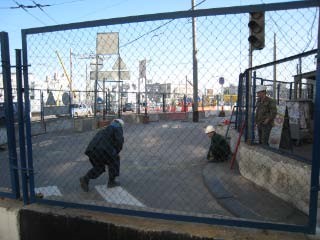
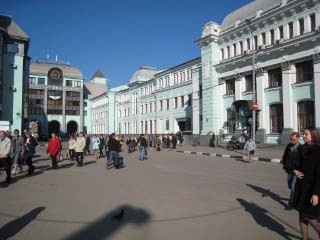
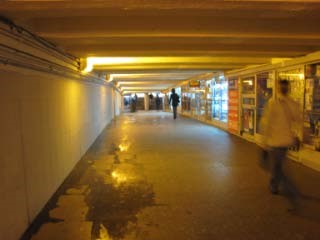

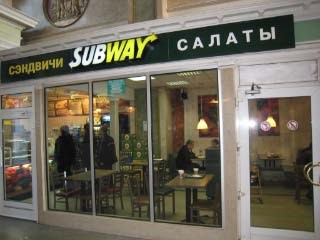
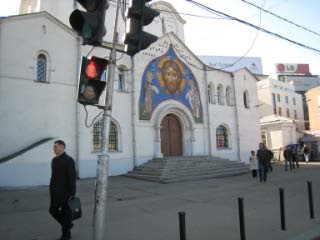 At 1:15 Marat picked us up and set off for the Savoy Hotel, where Jane’s daughter, Terri — our mystery guest of the week — will be staying. Jane has assembled a little package for Terri, including her badge for the fair, directions to the Manege, and of course the telephone that Jane has procured for her daughter and programmed all our numbers into.
At 1:15 Marat picked us up and set off for the Savoy Hotel, where Jane’s daughter, Terri — our mystery guest of the week — will be staying. Jane has assembled a little package for Terri, including her badge for the fair, directions to the Manege, and of course the telephone that Jane has procured for her daughter and programmed all our numbers into.
All mother-daughter relationships are complicated, and Jane and Terri have had their share of ups and downs. Still, it is evident in the way that Jane is always bragging about her daughter that she loves her very much. Terri, who does marketing for a New York hedge fund and is flying in from Prague, was some kind of infant prodigy — brilliant, beautiful and with world-class social instincts from the cradle. Jane’s stories of what is was like to raise a precocious daughter in New York City will be familiar to every mother, though perhaps a bit more intense. “When Terri was nine,” Jane will say, with a perfect mixture of horror and pride, “she snuck out of her room, rappelled down the side of the building, highjacked a police car; we only knew she was missing when we turned on the eleven o’clock news and saw her sitting on the lap of the second baseman of the New York Yankees at Studio 54.” Or “When when she was thirteen I’m coming home from Zabars and see Terri driving off in a limousine she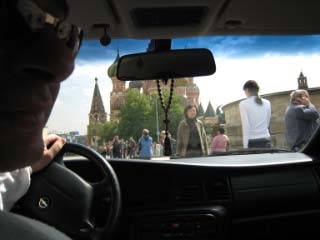 had charged on my credit card. As she sped off up West End Avenue she called out that she was just taking it to school, but we finally found her in St. Tropez!”
had charged on my credit card. As she sped off up West End Avenue she called out that she was just taking it to school, but we finally found her in St. Tropez!”
Terri is still beautiful, a world-class athlete who, Jane says, runs five miles every morning, a fixture at New York social events. Getting the M.B.A. at Columbia University really helped straighten her out a lot.
After we dropped off the package for Terri, Marat drove us half way around the city on the way back to the Manege (because, as you now know, there’s hardly any place a car is allowed to turn), happily pointing out the sights along with way. Kremlin. Zum and Gum department stores. Lubyanka Prison, headquarters of the old KGB. Who knows what else — Jane doesn’t speak Armenian very well yet, though she’s told Marat all about Terri and about her eleven-year-old granddaughter, Gabriela, the soccer star. It turns out that Marat was apparently a soccer player himself in his youth; I’m not sure what professional team (my Armenian is not so hot either), but apparently he played for the USSR team in the championships against Yugoslavia (or someplace similar, who knows?). 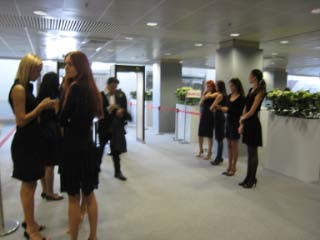
As we enter the Manege we have to pass a gauntlet of Russian eye candy that the organizers have dressed the doorway with. The girls are all tall, thin and beautiful. Jane is outraged with their legs, which are all like matchsticks (they wear towering high heels to maximize the effect). “It’s because they see women just as objects here – it’s ridiculous for women to have to make themselves into unnatural shapes just so they can serve as decoration, but they all buy into it! They don’t know any better.” Because you’ve watched from the start as we’ve built our booth, I think now you might like to see how it turned out. Remember, this is pretty much what Jane envisioned in her head months ago and set down on the graph paper with little squares. It shows, I think, how good she really is.
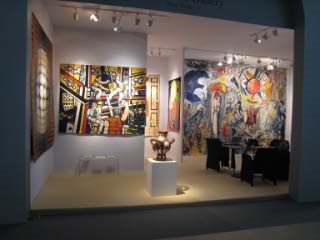
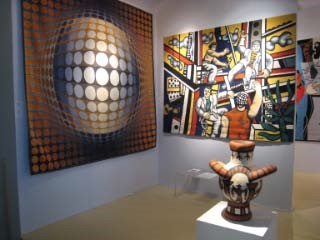
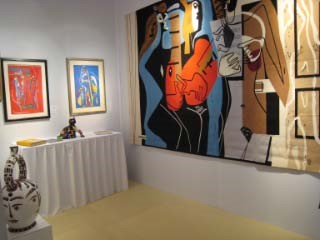
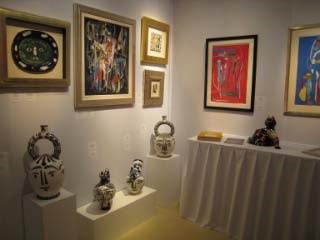
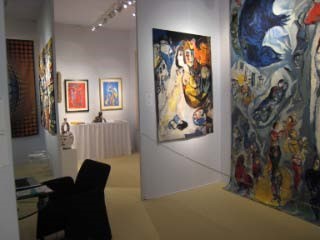
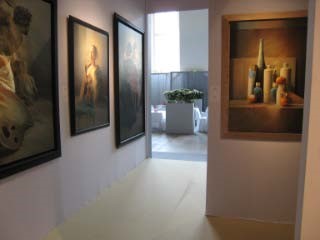
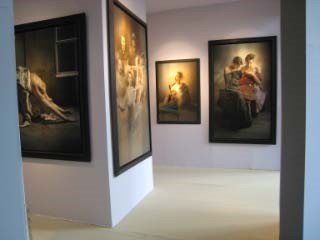 Yesterday was the press conference for the Russian media. Today it is the English-speaking press that has been brought in at 3:00 pm. The actual opening won’t be until 6:00 pm.
Yesterday was the press conference for the Russian media. Today it is the English-speaking press that has been brought in at 3:00 pm. The actual opening won’t be until 6:00 pm.
The fair organizers obviously have their weaknesses, but now their real strength is revealed. In New York City you have dozens of art fairs competing with literally thousands of important events of every size, shape and color. To get the city’s attention is virtually impossible unless you are the New York Mets and have just won the World Series. The Moscow World Fine Art Fair, however, is the biggest event in fine arts of the entire year in probably a thousand square mile area. There are journalists here from all over the world, but we are now amazed to learn that the fair organizers have actually junketed over fifteen or twenty writers from American art magazines. I give interviews to German, English and American journalists. Jane likes me to give these interviews because she thinks I am a better speaker than she (she’s a little shy, too, believe it or not), but I make her speak with Art & Auction, while I’m talking with Art & Antiques. She does brilliantly. Somewhere along the line I give an on-camera interview with Reuters — which could be picked up by any of the 500 television stations they sell to.
It’s all really quite amazing. We had sent out press releases to these very same magazines ourselves over the past few months, but such publications get hundreds of releases. When they fly you over to help you get the story, that’s different. We will have more publicity in American because we came to Russia, probably, than we’ve been able to attract in a decade by all our best efforts.
Somewhere before five Terri shows up. As you will from the photos below, she is perfect in every way. That’s John from Bloomberg in one of the pictures. Terri is ready to help and we try to put her to work. When she learns that we wrote to the director the Pushkin’s tapestry department to see if he might like to have one of the tapestries on loan before the fair (we never received an answer, though we had had Julia translate the letter into Russian), Terri wonders why Jane didn’t just call him up when we arrived. This is what Larry Gagosian would have done in a minute, says Terri. Gagosian is probably the biggest art dealer in America. Terri worked for him when she was just out of college. She’s right, we suppose. It’s hard for Jane to explain why we didn’t. She’s feeling uncomfortable, physically as well as psychologically — it’s been a stressful week. She can’t turn her head more than a few degrees in either direction for some reason. Julia says it is from carrying her heavy bag with all the fair materials all day for the past week. Julia herself has a headache.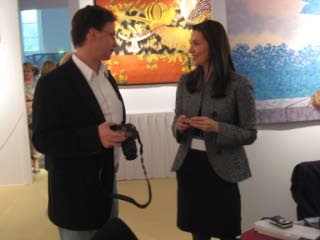
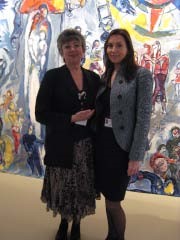
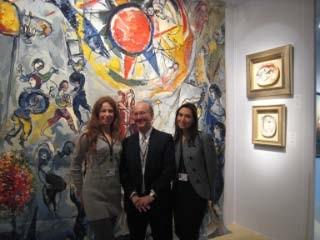
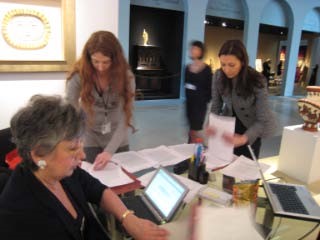
The crowds (about 8,000 people are expected tonight, though there could be a few thousand more) begin coming at 6:00 pm, and I’m afraid I don’t have any pictures because I was too busy trying to deal with all the people, all the questions, all the complexities that make up a Night At The Art Fair (sounds like the title of a Marx Brothers movie, doesn’t it? Like A Night At The Circus. A lot like, maybe.)
Toward the end of the evening Julia and I get into a little tiff. She thinks I could have explained certain aspects of the relationship between the artists and these tapestries which are after their images. I try to defend myself, but this is not the time to have an argument. Besides, she’s here to be a translator, not a critic. Selling at a venue like this is a kind of performance. You can’t tell an actor that he should have spoken his last few lines better as he is waiting in wings to go onstage again. Julia will not let it go. I learned the other day that this whole week she’s felt much like the Russian construction worker — that she had much to contribute, but didn’t feel fully utilized. We keeping beating dead horses, and I start criticizing her for not being supportive. Terri tries not to pay attention, but it is clear she thinks this is peculiar.
Julia’s ear is stopped up for some reason. Her headache is getting worse. Jane can’t turn her head. I’m feeling all deflated, even though the guy that Julia and I were arguing about will probably come back — I just wanted him to read the complete explanation of tapestry in the brochure Julia translated. Julia thought I should have made the points better in our personal exchange. Am I beating a dead horse again?
People finally start leaving, and we escape, too, at about 9:30.
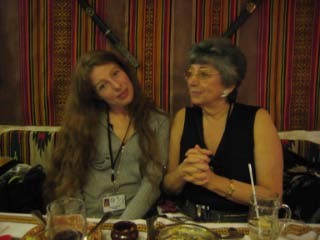 Tonight Julia has decreed that we will continue to explore the former republics, turning now to the Ukraine. We are supposed to go to Taras Bulba (as in the old Yul Brynner/Tony Curtis movie), but when we arrive there are no tables available. Terri doesn’t like the look of the place, being used to three star Michelin restaurants. She doesn’t understand what we see in peasant food. The management of Taras Bulba suggests another Ukrainian place. Marat sets out to find it, but we soon get lost — or rather, not lost, but simply thwarted. Every street he tries to turn down is blocked off. There’s no way to keep up with all the street realities, the city is changing too quickly.
Tonight Julia has decreed that we will continue to explore the former republics, turning now to the Ukraine. We are supposed to go to Taras Bulba (as in the old Yul Brynner/Tony Curtis movie), but when we arrive there are no tables available. Terri doesn’t like the look of the place, being used to three star Michelin restaurants. She doesn’t understand what we see in peasant food. The management of Taras Bulba suggests another Ukrainian place. Marat sets out to find it, but we soon get lost — or rather, not lost, but simply thwarted. Every street he tries to turn down is blocked off. There’s no way to keep up with all the street realities, the city is changing too quickly.
A few days ago, Julia told me a story about how she used to get terrible earaches when she was eight year old. She became afraid to tell her family that her ears hurt because then invariably they would say, “Juuuuuuulia. Why have you made yourself sick?” So she would keep quiet until she started to cry, and only then would her trouble be revealed. Now her ear is hurting in earnest. It is all stuffed up, and it just won’t open. She tells me that she is becoming frightened. I try to get her to pull the plug on the evening, but she won’t hear of it. She is starting to cough.
We arrive at the suggested alternative Ukrainian restaurant. None of us like the look of it, but it is getting very late now and we have to eat. Jane keeps bombarding Terri with tales of how much fun we’ve been having at ethnic restaurants. Terri looks skeptically at the menu. She keeps to an extremely healthful diet in between workouts.
“I don’t think there’s anything here I can eat,” she says, wrinkling her perfect nose.
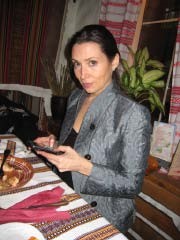 Jane keeps on trying to get her to understand how wonderful ethnic food can be, but Terri has to make that faithful choice: Whom is she going to believe? Her mother? Or her eyes?
Jane keeps on trying to get her to understand how wonderful ethnic food can be, but Terri has to make that faithful choice: Whom is she going to believe? Her mother? Or her eyes?
“I mean, look at this menu,” she says with surprising tenderness, trying to keep her perfect smile from disintegrating. “Smoked Lard. Rolled Lard. Lard with spices.”
“What, ” I venture in amazement. “You don’t like lard?”
We all finally find things to order, but it isn’t easy. Terri pushes away her salad — it is too salty. Jane keeps chattering happily about how good all of other restaurants were this week, but she cannot turn her head. Julia keeps opening and closing her mouth, trying to open up her ear, but not succeeding. She tries to conceal it, but she is looking very scared. She is worried about going back to the cold apartment.
As we are leaving I pull Jane aside and tell her that Julia is in real distress and that we can’t let her go back to Natalia’s. Jane was so focused on trying to show Terri a good time that she didn’t realize the situation was so bad. She does now, in an instant.
“You’re coming back to the hotel with us,” Jane tells Julia. Julia tries to protest for a moment, but she is too frightened and uncomfortable to make pretences. She accepts with noticeable relief. Terri does her best to be conciliatory, but she is tired and just wants to go back to her hotel and go to bed. We drop her off, then head back to the Sheraton. It is after midnight when Marat drops us off and departs for the night. At the front desk, however, Jane is told that there are absolutely no other rooms available. 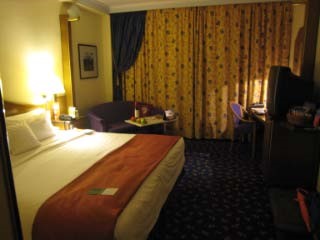 There are no hotel rooms available anywhere in the city.
There are no hotel rooms available anywhere in the city.
“You’re going to stay with me in my room,” Jane tells Julia. “There’s a big double bed in the room and a deep bathtub. You’ll be fine.”
“Yes, thank you,” said Julia. It never occurred to her that Jane would get her a separate room of her own. Of course this had been Jane’s intention, though it would have cost a fortune.
“Are you all right?” I ask. “I’m sorry if we argued earlier. I’m horrified if I’ve given you my cold.”
“No,” says Julia. “I have had a problem for a long time, but I just don’t understand why my ear is plugged up and I cannot open it. I don’t want to have an earache.” She stiffens her lip.
“I will do traditional Russian treatments. I will take hot and cold baths and give myself a vodka compress. I will be better soon.”
Jane and Julia head to their room, and I to mine. It is hard to determine who among us is the most worried.
